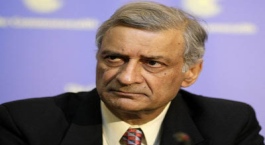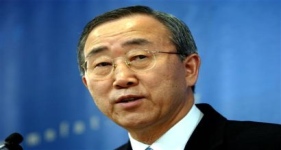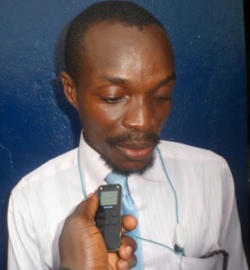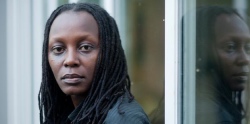BY NATASHA BARSOTTI – For the fourth time in a year,
Commonwealth Secretary General Kamalesh Sharma has spoken out against
discrimination based on sexual orientation, his latest statement made before
the United Nations Human Rights Council in Geneva on Feb 29.
![]()
“Discrimination on the grounds of sexual orientation
is an area of concern on which we have given the perspective of Commonwealth
values in various fora, including in this Council,” Sharma said. “Our
position continues to be that we oppose discrimination or stigmatization on any
grounds, including those of sexual orientation.”
Great . . . except for this disappointingly watered-down
conclusion: “It is for member states to address incompatibilities between
Commonwealth values and mostly inherited national laws in these areas.”
“It is, in effect, a hands-off approach,” UK gay
rights activist Peter Tatchell complains. “Without serious pressure from
the Commonwealth leadership, many member states will not abandon their
homophobia and transphobia. Our argument is that 80 percent of Commonwealth
countries are guilty of persistently violating the human rights of LGBTI
people; it’s therefore the responsibility of the Commonwealth Ministerial
Action Group to increase the pressure for the decriminalization of
homosexuality and the legal protection of LGBTI against discrimination.”
To be fair, Sharma has been the most publicly outspoken secretary-general the Commonwealth has had on the question of queer rights.
Quite an achievement, Tatchell notes, but clearly Sharma is “nervous and
cautious.”

Needlessly so, he believes. “It’s time for him to be
bolder, with the knowledge that there are LGBTI and human rights defenders in
all Commonwealth countries who will support and applaud him.” And who need
to hear that support loudly, clearly, consistently.
Perhaps he should take a cue from his UN counterpart,
South Korean-born Ban Ki-Moon, who just raised a ruckus for unabashedly urging
Zambia to respect gay rights in a “people driven” constitution.

In response to a reporter’s question following a meeting
with Zambian President Michael Sata, Ban Ki-Moon said, “There is need to
respect the rights of everybody, not only in Zambia but everywhere else in the
world. I know that President Michael Sata supports the call for the respect of
everybody’s rights regardless of sexual orientation,” The Times of South
Africa reported.
But a government spokesperson quickly tried to quash any
notion that Zambia plans to decriminalize homosexuality. And brought
out the tiredly oxymoronic we-are-a-Christian-nation,
stop-trying-to-recolonize-us diatribe from the usual religious and
anti-progressive suspects.
The program director of a group called — irony of ironies
— Zambia Rainbow Coalition wants Ban to apologize for his queer-supportive
statements and goes on to parrot the gay-is-a-mental-illness mantra. Too bad
the group chooses to ignore its fifth goal, about establishing “a platform
for all Zambians for their voices to be heard.”
Hopefully Ban does not cave in, or even better,
reiterates in the strongest terms his and the UN’s intention of staying the
course on this portfolio. Ditto Sharma.
The key to defending and advocating for queer rights in
Africa is the work of local grassroots and human rights organizations, Tatchell
emphasizes, adding that even as they must take the lead, institutions like the
Commonwealth, the UN and Western governments should focus their attention on
supporting such organizations to speak for themselves, through funding their
offices and campaigns and by providing human rights training for their
members.
Evidence of courageous persistence of the African
continent’s queer activists is pervasive. So is evidence of the ruthless
attempts to counter their activism. On Feb 23, some 500 people gathered near a
radio station to oppose Liberian gay activist Archie Ponpon’s campaign to
legalize same-sex marriage. Ponpon
and a group of his followers were escorted off the premises by police called by
the radio station’s manager — reportedly the third time Ponpon had to be
rescued from angry gatherings.

In Uganda, a queer-rights workshop was raided and shut
down by the country’s state minister of ethics and integrity one week after the
umpteenth reintroduction of the so-called “Kill the gays” bill.
“I have closed this conference because it is
illegal. We do not accept homosexuality in Uganda, so go back home,” the
minister, Simon Lokodo, told the workshop participants, according to the
advocacy group Sexual Minorities Uganda (SMUG). Lokodo also tried to arrest
Kasha Jacqueline Nabagasera, a prominent queer rights activist and winner of the
2011 Martin Ennals Award for Human Rights Defenders, for reportedly attempting
to thwart the minister’s actions.

And an event as seemingly innocuous as a beauty
pageant is feeling the backlash over the squashing of queer rights on the
continent.
“It is indeed sad that we have lost a delegate from the African continent,” current Mr Gay World, South Africa’s Francois Nel, said in a statement about the withdrawal of Mr Gay Zimbabwe, Taurai Zhanje, from this year’s competition in Johannesburg, South Africa. “Africa needs a great deal of attention in terms of advancement of LGBTI rights, and it would have been very favourable to have full representation of the African continent in the competition. But nevertheless, my thoughts are in complete agreement with the response from Mr Gay World directors, that even just entering the competition is already a very brave and commendable achievement.”

 Why you can trust Xtra
Why you can trust Xtra


